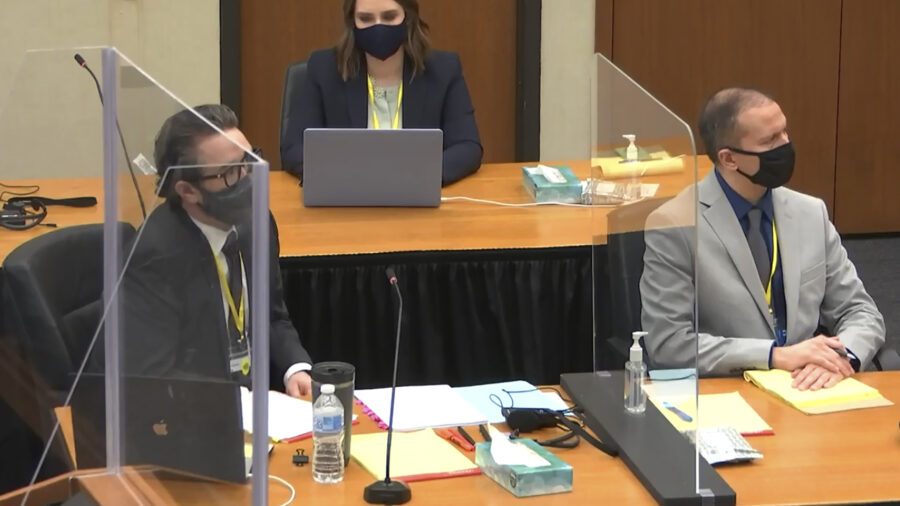MINNEAPOLIS—A judge on Wednesday dismissed two jurors who had been seated for the trial of a former Minneapolis police officer in George Floyd’s death over fears that the jurors had been tainted by the city’s announcement last week of a $27 million settlement to Floyd’s family.
Hennepin County Judge Peter Cahill recalled seven jurors and was questioning each one in turn to find out what they knew about the settlement and whether it affected their ability to serve. Former officer Derek Chauvin’s attorney, Eric Nelson, had requested the recall.
Cahill was being careful to ask jurors if they had heard the news of the settlement without giving details, saying only that there had been “extensive media coverage about developments in a civil suit between the city of Minneapolis and the family of George Floyd” and asking if they had been exposed to it.
The first dismissed juror said he had heard about the settlement. “I think it will be hard to be impartial,” he said.
“That sticker price obviously shocked me,” the second juror dismissed said. He said he thought he could set the news aside, but wasn’t sure, and after a long pause, Cahill dismissed him.
Cahill retained five other jurors.

Nelson had called the timing of the announcement in the middle of jury selection “profoundly disturbing to the defense” and “not fair.” He has also requested a delay in the trial, which Cahill is considering. Nine people had been selected for the jury, including seven before Friday’s settlement was announced.
Jury selection through Tuesday had been proceeding faster than expected. Cahill has set opening statements for March 29 at the earliest, but dismissal of some of the jurors already seated risked imperiling that date.
Nine jurors had been seated through Tuesday. The jurors include six men and three women and range in age from their 20s to their 50s. Fourteen people, including two alternates, are needed.
Chauvin is charged with murder and manslaughter in the May 25 death of Floyd, who was declared dead after Chauvin pressed his knee against his neck for about nine minutes.
On Tuesday, the two sides skirmished over whether evidence of Floyd’s 2019 arrest in Minneapolis should be allowed at trial.
The judge previously rejected Chauvin’s attempt to tell the jury about the arrest—a year before his fatal encounter with Chauvin—but heard fresh arguments Tuesday from both sides. He said he would rule on the request Thursday.
Nelson argued that new evidence makes the earlier arrest admissible: Drugs were found last December during a second search of the car Floyd was in, and were found in a January search of the squad car into which the four officers attempted to put Floyd.
He also argued the similarities between the encounters are relevant: Both times, as officers drew their guns and struggled to get Floyd out of the car, he called out for his mother, claimed he had been shot before and cried, and put what appeared to be pills in his mouth. Both searches turned up drugs in the cars. Officers noticed a white residue outside his mouth both times, although that has not been explained.
In the first arrest, several opioid pills and cocaine were found. An autopsy showed Floyd had fentanyl and methamphetamine in his system when he died.
“The similarities are incredible. The exact same behavior in two incidents, almost one year apart,” Nelson said.
Paramedics who examined Floyd in 2019 warned him that his blood pressure was dangerously high, putting him at risk for a heart attack or stroke, and took him to a hospital for examination. Nelson argued that shows Floyd knew that swallowing drugs might result in going to the hospital rather than jail.
But prosecutor Matthew Frank argued that evidence from the 2019 arrest was prejudicial. He called it “the desperation of the defense to smear Mr. Floyd’s character, to show that what he struggled with an opiate addiction like so many Americans do, is really evidence of bad character.”
And he argued that the only relevant thing in Floyd’s death is how he was handled by Chauvin and the other officers.
“What these officers were dealing with is what they were responsible for,” Frank said. “What is relevant to this case is what they knew at the scene at this time.”
Cahill said he would stop the defense “very quickly” from suggesting at trial that Floyd didn’t deserve sympathy because he used drugs.
“You don’t just dirty up someone who has died in these circumstances as a defense,” he said. But he said he would weigh the defense’s argument that alleged drug use during the 2019 arrest that led to “a hypertensive emergency” is relevant to what may have caused Floyd’s death in 2020.
“I think that’s, that’s the only relevance I see,” Cahill said.
The question of Floyd’s drug use has played out in jury selection, with prosecutors gauging prospective jurors’ attitudes.
Three other former officers face an August trial in Floyd’s death on charges of aiding and abetting second-degree murder and manslaughter.
By Steve Karnowsi and Amy Forliti


